-
- About the Department
- Vision
- Mission
- Program Educational Objectives (PEOs)
- Program Outcome (POs)
- Program Specific Outcomes (PSOs)
- Faculty Of Electrical Engineering
- Magazines
- Syllabus & Course Outline
- Laboratories
- Practices & Innovation in Teaching Learning
- Professional Society
- Departmental Activities(Guest Lectures & Industrial Visits)
- Academic Calendar
- Project
- Research & Development
Department of Electrical Engineering
Established in the year 2008, the department of electrical engineering is synonymous with excellence for its B.Tech. Programme in Electrical Engineering and has been playing a vital role in producing technologists and to fulfill the ever challenging needs of technical excellence in all areas of electrical engineering. Being one of the core engineering disciplines, the Electrical Engineering is concerned with the study, design, manufacturing and application of equipments, devices, and systems which use electricity, electronics, electromagnetism and related industries. B.Tech. (Electrical Engineering) provides students with a wide range of fundamental knowledge in core disciplines such as, control systems, power systems, power electronics, and electrical machines. To provide the excellence in teaching and learning, the qualified faculty members with excellent academic records are the virtue of the department. The students achieve in-depth practical learning using state of the art laboratory facilities available in the department. The department has remarkable collaborations & MoUs with leading industries and education institutions. Being a specialized resource, to cater the unique needs of students and faculty of the department, a dedicated departmental library is available with a large collection of study materials relevant to the field of electrical engineering. The computer and internet facilities are made available to the students round the clock. The department has involved in conducting various departmental activities, such as workshops, seminars, guest lectures, training programs, industrial visits, etc.
Why to Choose Electrical Engineering?
Electrical Engineers focus on the analysis, design, development and manufacture of electrical equipments, electronic devices, Mechatronics technologies, and automation and control systems. Graduate Engineers in this discipline are involved in the design, analysis, testing, installation, maintenance, security and operation of power related equipment and systems, across industries. Some emerging fields are electric vehicles, renewable energy (solar & wind energy), distributed generation, smart-grids, electrical power industry, etc.
Job Opportunities:
UPSC, GATE, NTPC, DRDO, PGCIL, SAIL, BHEL, NPCL, NHPC, BEL, ECIL, DMRC, DVC, Electricity Board, Indian Railway, Hydro Power Plant, Thermal Power Plant, ESSAR, BOSCH, Mahindra, L&T, Vedanta, Ashok Leyland, TCS, Infosys, HCL, Accenture, etc.
Vision
To emerge as a centre of excellence in the field of Electrical Engineering to enhance the technical and professional skills of the students and make them competent enough to cater the multidisciplinary needs ofacademia, industry and society with strong moral and ethical values.
Mission
- M1-To provide an environment for effective teaching-learning process with the incorporation of multidisciplinary approach to develop competent Electrical Engineers.
- M2-To strengthen students technically & professionally in Electrical Engineering domains using state of art technology which leads to successful employability, higher education and entrepreneurship.
- M3- To foster an inspiring atmosphere which induces a passion for lifelong learning with incorporation of human values and ethics.
Program Educational Objectives (PEOs)
- PEO1:- The graduates will analyse, design and develop tools, applications and systems based on Electrical Engineering principles to solve real life problems of industry and society.
- PEO2:- The graduates will have the capability of working individually as well as in teams with effective communication skills, leadership quality, ethical values and an instinct for lifelong learning.
- PEO3:-The graduates will have the potential for higher education, research and entrepreneurship in the field of Electrical Engineering and related domains.
Program Outcome (POs)
Engineering knowledge
Apply the knowledge of mathematics, science, engineering fundamentals, and an engineering specialization to the solution of complex engineering problems.
Problem analysis
Identify, formulate, review research literature, and analyse complex engineering problems reaching substantiated conclusions using first principles of mathematics, natural sciences, and engineering sciences.
Design/development of solutions
Design solutions for complex engineering problems and design system components or processes that meet the specified needs with appropriate consideration for the public health and safety, and the cultural, societal, and environmental considerations.
Conduct investigations of complex problems
Use research-based knowledge and research methods including design of experiments, analysis and interpretation of data, and synthesis of the information to provide valid conclusions.
Modern tool usage
Create, select, and apply appropriate techniques, resources, and modern engineering and IT tools including prediction and modelling to complex engineering activities with an understanding of the limitations.
The engineer and society
Apply reasoning informed by the contextual knowledge to assess societal, health, safety, legal and cultural issues and the consequent responsibilities relevant to the professional engineering practice.
Environment and sustainability
Understand the impact of the professional engineering solutions in societal and environmental contexts, and demonstrate the knowledge of, and need for sustainable development.
Ethics
Apply ethical principles and commit to professional ethics and responsibilities and norms of the engineering practice.
Individual and teamwork
Function effectively as an individual, and as a member or leader in diverse teams, and in multidisciplinary settings.
Communication
Communicate effectively on complex engineering activities with the engineering community and with society at large, such as, being able to comprehend and write effective reports and design documentation, make effective presentations, and give and receive clear instructions.
Project management and finance
Demonstrate knowledge and understanding of the engineering and management principles and apply these to one’s own work, as a member and leader in a team, to manage projects and in multidisciplinary environments.
Life-long learning
Recognize the need for, and have the preparation and ability to engage in independent and life-long learning in the broadest context of technological change.
Program Specific Outcomes (PSOs)
- PSO1– The ability to analyse, design and develop systems that generate, transmit and utilize electrical energy in an efficient way.
- PSO2– The ability to be proficient in the use of automation technology required to implement electrical engineering practices.
Faculty Of Electrical Engineering
| Name of the Faculty | Designation | Department | Highest Qualification |
| KESHAV PRATAP YADAV | ASST PROFESSOR (HOD) | Electrical Engineering | M TECH |
| MALIK RAFI | PROFESSOR | Electrical Engineering | PHD |
| SURESH CHAND | PROFESSOR | Electrical Engineering | PHD |
| SOMNATH SHARMA | ASST PROFESSOR | Electrical Engineering | M TECH |
| PRADEEP KUMAR | ASST PROFESSOR | Electrical Engineering | M TECH |
| MAHATABUL HAQUE | ASST PROFESSOR | Electrical Engineering | M TECH |
| LALIT SINGH | ASST PROFESSOR | Electrical Engineering | M TECH |
| ASHISH MISHRA | ASST PROFESSOR | Electrical Engineering | M TECH |
| VIPIN KUMAR SHUKLA | ASST PROFESSOR | Electrical Engineering | M TECH |
| AMAR BAHADUR | ASST PROFESSOR | Electrical Engineering | M TECH |
| GAURAV GUPTA | ASST PROFESSOR | Electrical Engineering | M TECH |
| ROHIT KUMAR GUPTA | ASST PROFESSOR | Electrical Engineering | M TECH |
| SERAZ AHMAD | ASST PROFESSOR | Electrical Engineering | M TECH |
| ANAND RAW | ASST PROFESSOR | Electrical Engineering | M TECH |
Magazines
Syllabus & Course Outline
Laboratories
The department has established following laboratories:
- Basic Electrical Engineering Lab
- Electrical Workshop Lab
- Electrical Measurements and Instrumentation Lab
- Circuit Simulation Lab
- Electrical Machines – I Lab
- Network Analysis & Synthesis Lab
- Electrical Machines – II Lab
- Control System Lab
- Power System-I Lab
- Power Electronics Lab
- Power System-II Lab
- Industrial Automation & PLC Lab
- Project Lab
Practices & Innovation in Teaching Learning
Innovative teaching methodologies help faculty to deliver their lectures in a faster and efficient manner thereby allowing the students to keep abreast of technological advancements. In addition, innovative teaching aids also impart rationale thinking and self sufficient thought process in the mindsets of students by making them more proactive. Department offers a dynamic learning environment that emphasizes practical-oriented and project-based learning. We employ a student-centered pedagogy, enabling students to grasp the course content through hands-on experience. We believe that students thrive when actively engaged in exploring the physical world around them. These innovative approaches facilitate the development of practical knowledge, effective problem-solving skills, self-directed learning, collaborative abilities, and intrinsic motivation.
Multimedia Learning: In this, the teacher will deliver some concepts with the aid of Software tools. These learning tools play vital role in delivering subject knowledge. The students can identify the key points of presentation easy way.
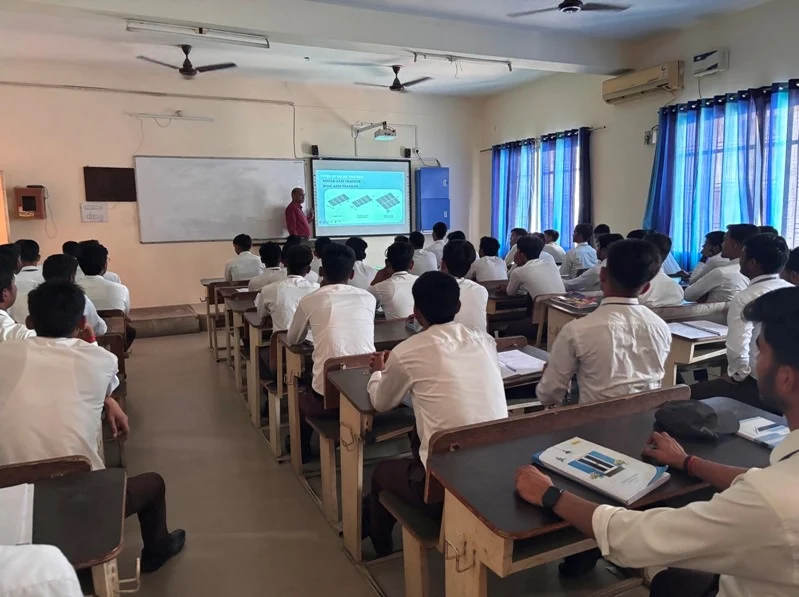
Smart Class Room
Live demonstration can be an effective tool to present material in classroom and encourage student learning. Multimedia combines basic types of media into learning environment such as text, audio, video and graphics thus providing a powerful tool for teaching. This allows the students to pay more attention towards the concepts. It also helps the students to think and analyze the concepts in a better way. The teacher explains some topics in their regular teaching process using Software Tools /Animation / Videos to simplify their presentation. By using the system a tool, the Students understand the topics in a better way are due to animation as in compare to tradition teaching.
Each One, Teach One Learning: Each One, Teach One Learning process is the collaboration between the faculty and students to learn and share knowledge about their community and culture. When someone learned how to read or write, it became their responsibility to teach someone else. The idea is to spread knowledge for the betterment of their community. This program will teach you how to give back to your community to learn and share knowledge. In this connection the Department had taken an initiative the same to improve the student skill set and this methodology helps the students to improve their presentation, communication skills, and knowledge level in the concepts by self preparation and presentation. It helps the students to enrich themselves towards self learning and employability. Students teach a topic from the subject in the presence of the teacher. The students are benefitted by Improvement in subject knowledge, self learning, & presentation skills.
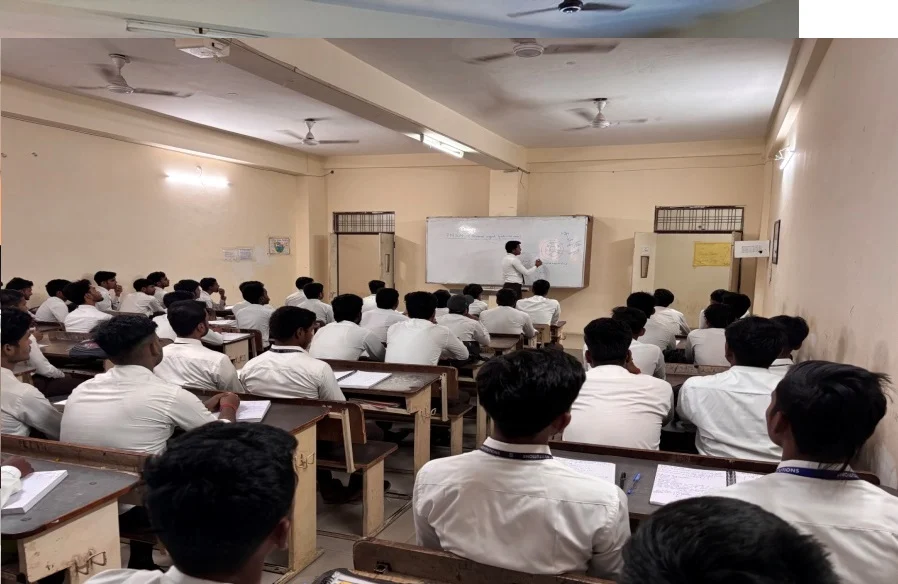
Lecture Delivered by Student
Virtual Labs Learning: As an initiative by the MHRD, in laboratories learning, relevant experiments are displayed to students with the help of simulations uploaded on the labs website http://www.vlab.co.in/ such as Electrical Machines Lab, Power Electronics Lab, etc. The virtual labs are introduced for creating a diversified online learning platform to learn concepts and methodologies of engineering practically through various laboratories.
| S. No. | Name of Laboratory | Webpage Link |
| 1. | Basic Electrical Engineering Lab | https://vlab.amrita.edu/?sub=1&brch=75 |
| 2. | Analog Electronics Lab | https://ade2-iitr.vlabs.ac.in/ |
| 3. | Electrical Measurements and Instrumentation Lab | https://elms-iitr.vlabs.ac.in/ |
| 4. | Circuit Simulation Lab | https://asnm-iitkgp.vlabs.ac.in/ |
| 5. | Electrical Machines Lab | https://ems-iitr.vlabs.ac.in/ |
| 6. | Digital Electronics Lab | https://de-iitr.vlabs.ac.in/ |
| 7. | Control System Lab | https://ce-dei.vlabs.ac.in/ |
| 8. | Power System Lab | https://vp-dei.vlabs.ac.in/Dreamweaver/ |
| 9. | Power Electronics Lab | https://pe1-iitd.vlabs.ac.in/ |
| 10. | Industrial Automation & PLC Lab | https://ial-coep.vlabs.ac.in/ |
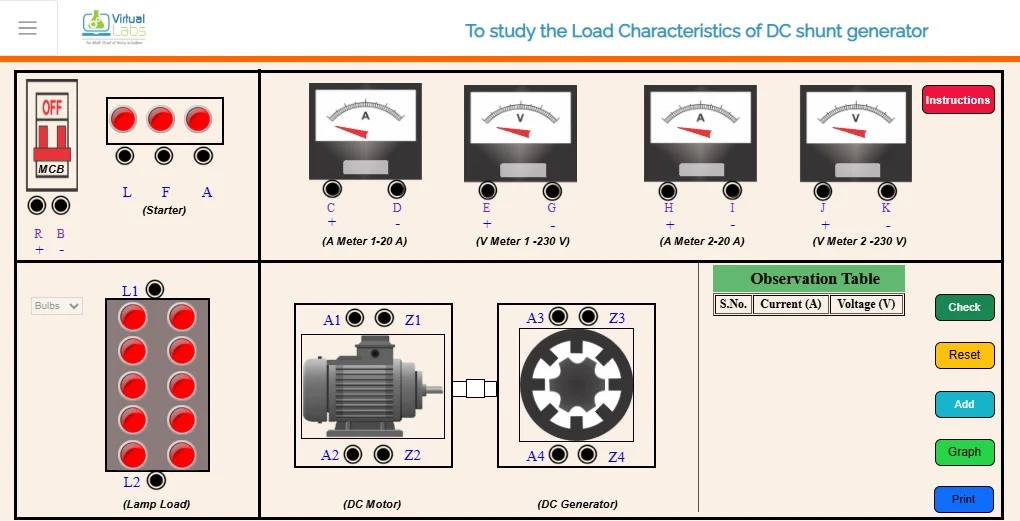
Virtual Lab
The virtual lab stimulates students to conduct experiments by their curiosity. This would help them in learning basic and advanced concepts through remote experimentation. The students are benefitted by virtual learning of practical experiments, diversified learning and application oriented real time learning.
E-Learning: Advanced Learners are encouraged to take up various certification courses, projects based on choice and present papers in conferences/ journals. Students and faculty members are encouraged to register and utilize the NPTEL/SWAYAM program/ online certification courses of their own areas of teaching and research interests, for enhancing their teaching skills, smooth conduct of the teaching process in the regular class room teaching and for understanding the potential concepts much effectively. The students who have not registered for any courses are supported by providing the NPTEL video lectures links of all these courses by the faculty. It helps to enrich the knowledge potentials of students and enhance their employability skills.
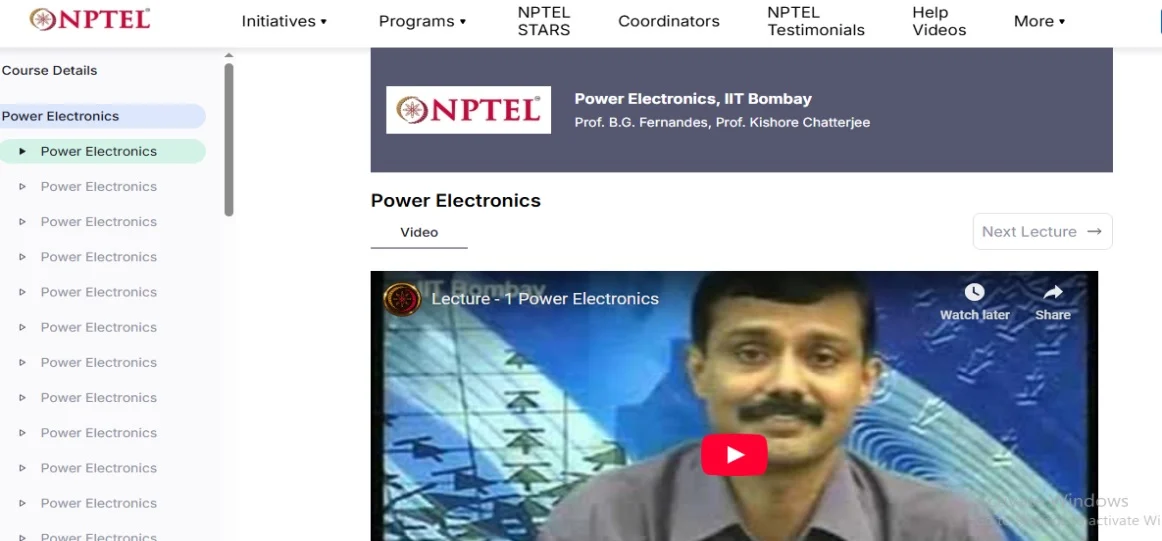
NPTEL Video Lecture
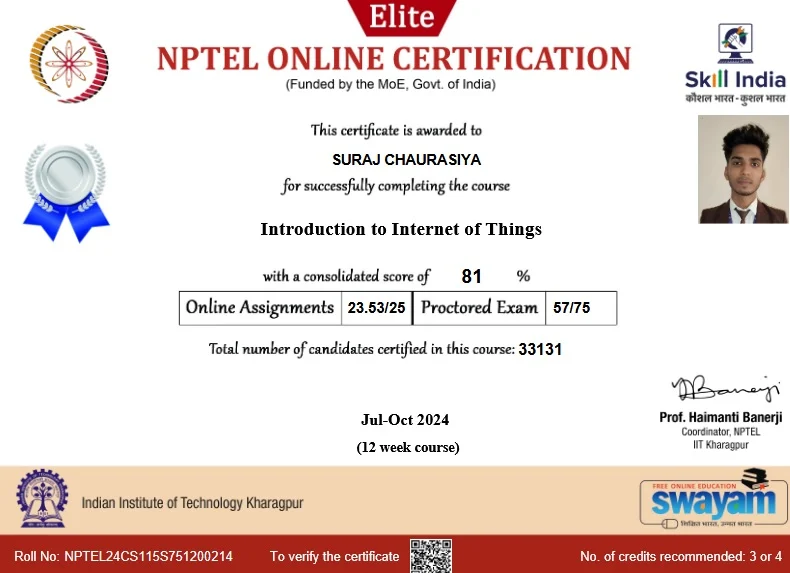
Employability Skill Learning: In view of the employability of the students, department has been providing the technical and soft skills classes throughout the session for overall grooming of the students. These classes empower students with confidence, serenity, fluency etc. Also, the overall students’ qualities are enhanced. These classes comprise of aptitude class and personality development class for two to three lectures per weeks for second, third and final year students. These classes are conducted by eminent faculties from training and placement department. During the class, regular assessment is done to observe the potential of the students. Based on the feedback, special emphasis is made to train the students to meet the requirements of the industry. These classes are highly valuable for the students who would be taking part in group discussions and interviews and campus drives.
Project-Based Learning: Students work on projects that engage them in solving a real-world problem or answering a complex question, over an extended time and gain knowledge & skills by working for an extended time to investigate and respond to an authentic, engaging, and complex question, problem, or challenge.
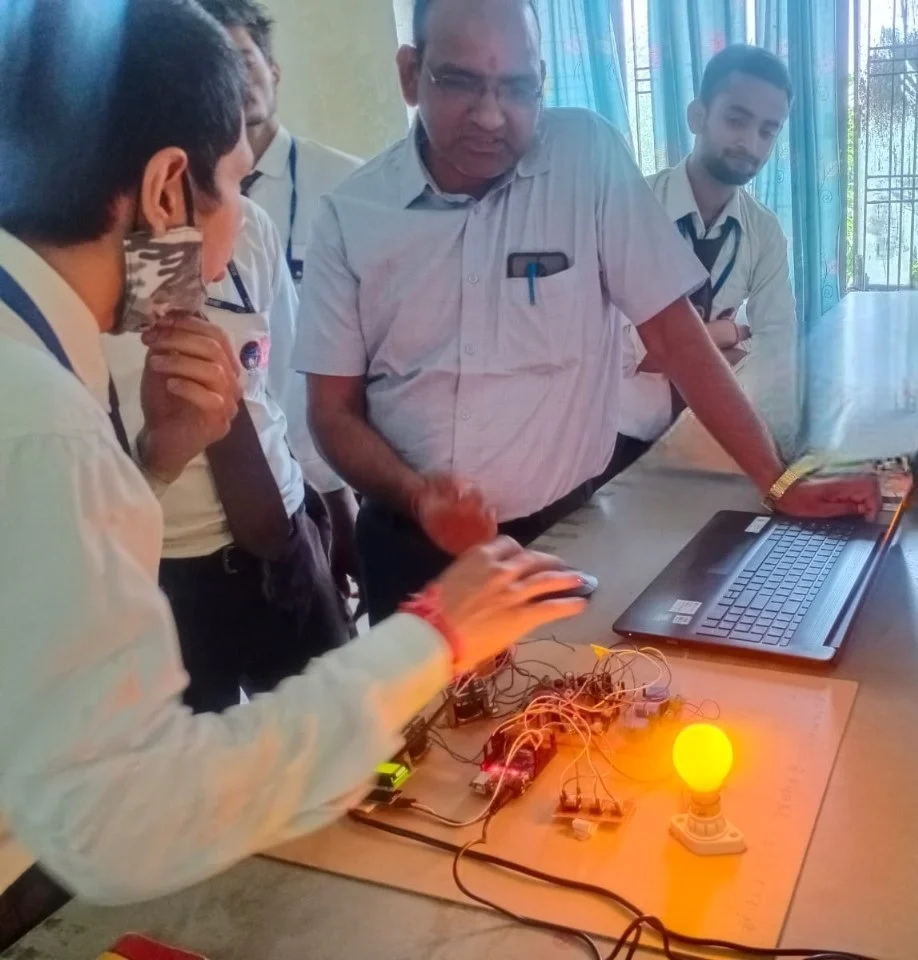
Project Demonstration
They demonstrate their knowledge and skills by developing a product or presentation. As a result, students develop deep content knowledge as well as critical thinking, creativity, and communication skills in the context of doing an authentic, meaningful project. Project Based Learning unleashes contagious, creative energy among students and teachers. Sessions are arranged for demonstration of the working model of the projects, which is of utmost necessity for the students to have knowledge in hardware aspects.
Innovation in Laboratory Experiments: To develop experimental skills, experience phenomena directly & Connect book knowledge to real-world applications in the students, all labs are equipped with latest equipments with standard operating procedures.
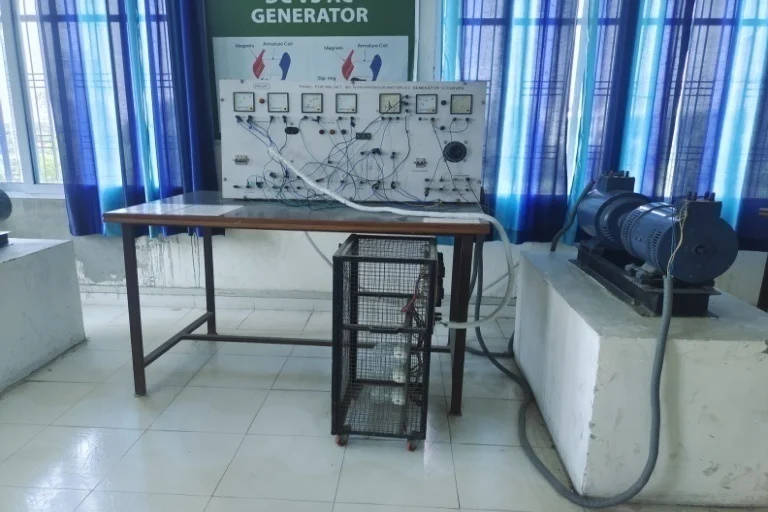
Experimental Setup
Simulations are also performed with the help of MATLAB/Simulink & other software tools for the program specific experiments.
Industrial Visits: Students are exposed to industrial environment to have practical knowledge and hands-on interaction with industry executives and to bridge the gap between industry and academia. Regular industrial visit are organized for students like, UPNEDA Lucknow, 33/11 KV Substation Ahibaranpur, Lucknow and summer internship in various industries.
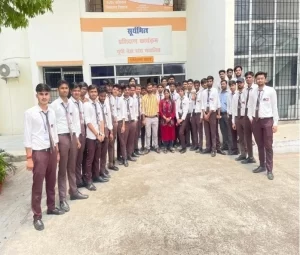
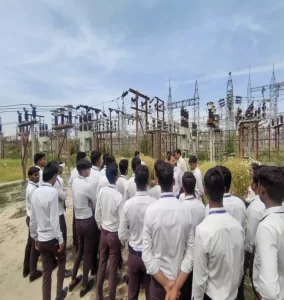
Industrial Visits UPNEDA & UPPCL Lucknow
Question Bank Management System: The management of question banks in the field of electrical engineering is crucial for enhancing the efficiency of both teaching and learning processes. In the department, the management of question banks has been a manual task, with teachers responsible for typing and editing questions. Question bank structure is helpful for the various internal and external examinations as well as various competitive examinations. It includes almost all courses/ topics and difficulty level associated. A question bank for each course is prepared by concerned course instructor.
Innovative Assignment Practices: In general practice, assignments are given to the students to improve knowledge through self-learning by referring available resources. But incorporating innovative methodology in the preparation of assignments the outcome is improved. One assignment per course outcome during the semester is assigned to improve learning ability and subject knowledge.
Mentor-Mentee Systems: A small group of students are allocated to each faculty (mentor-mentee system). Faculty counsellor / Mentor prepare their students in individually for viva-voce & monitor their academic performance continuously. Faculty counsellor / Mentor monitor all the activities of the students.
Instructional Charts based Learning: Many students are visual learners and understand concepts better when they are presented visually. The instructional charts are educational tools used by teachers to visually display information, an innovative tool in the teaching and learning process.
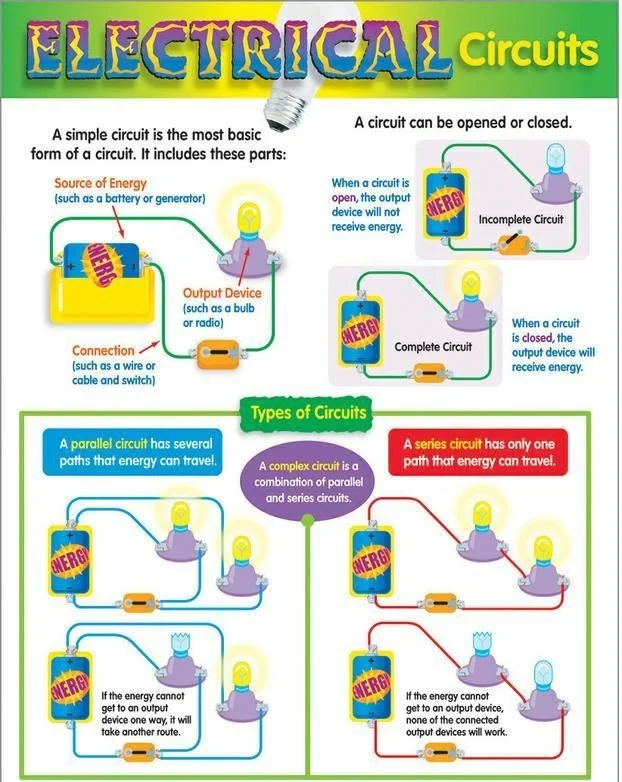
Instructional Charts
These charts present data, illustrate concepts, outline processes, or provide guidelines in a visually engaging manner. The common benefits for the students are visual learning, engagement and interest, memory aid, encourages critical thinking, an alternative way to access and understand information.
Power point presentation based Learning: Using, power point presentation, an innovative tool, the faculty can create & engaging visual presentations, allowing faculty and students to communicate ideas, information, and concepts effectively through slides that can include text, images, videos, and animation, etc.
Video Lectures based Learning: The department extensively practice video lectures based learning in using video as the primary medium for delivering educational content, offering a multisensory learning experience that combines audio, visuals, and text. The benefits for students are that videos can capture and maintain attention better than traditional text-based materials, leading to increased engagement and better knowledge retention, improved comprehension, and accessibility and convenience.
Seminars: The faculty also utilizes the seminar-based teaching, a form of innovative learning, for students discussing pre-assigned questions or issues in small groups, guided by the teacher.
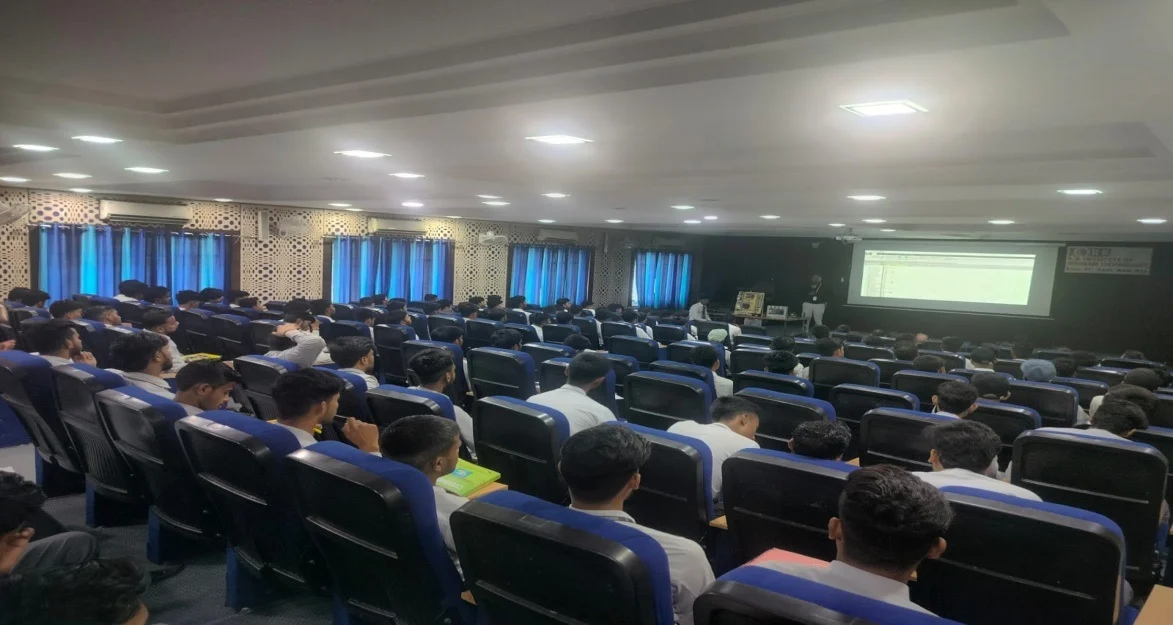
Seminar-Based Teaching
It encourages active participation, collaboration, and critical thinking, moving beyond traditional lecture-based learning.
Expert Lectures: In order to offer our students latest insights into the emerging technologies and advancements, expert lecture series are organized to help our students gain strong foothold in the field of electrical engineering and help them stand out among the rest
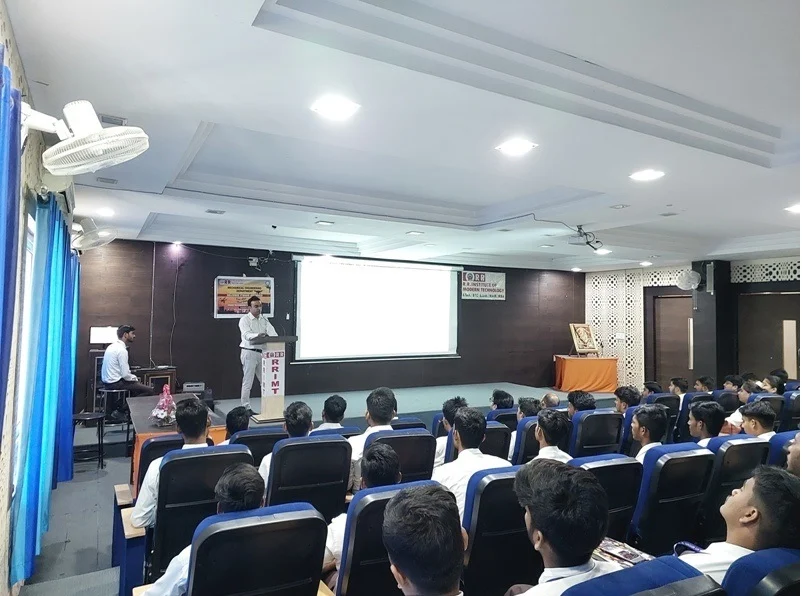
Expert Lecture
Instead of solely relying on traditional lectures, instructors can utilize expert lectures to provide foundational knowledge and then engage students in activities like research, application, and problem-solving. This approach fosters deeper understanding and encourages active learning.
Professional Society
- Institute of Engineers India
Guest Lectures and Industrial Visit
| Guest Lectures/ Workshop /Industrial Visit | Resource Person with designation / Organization |
| Guest lecture on DC Transmission Systems | Dr. Fazan Arif khan
Assistant Professor Integral University Lucknow, Uttar Pradesh |
| Guest Lecture on Power System Economics and Management | Mr.Adeeb Uddin Ahmad
Assistant Professor Department of Electrical Engineering Institute of Engineering & Technology Sitapur Road Lucknow |
| Workshop on PLC | Er. Mahfooz Ahmad(CTO)
Electrocus Solution Lucknow |
| Workshop on Industry 4.0 | Er. Mahfooz Ahmad(CTO)
Electrocus Solution Lucknow |
| Industrial visit (EE-3rd Year) | Uttar Pradesh Power Corporation Limited Sitapur |
| Industrial visit(EE-3rd Year) | UPPCL Baksi Ka Talab Lucknow |
| Industrial visit (EE-4th Year) | Rameshwar Das Ram Niwas Group of Industries Lucknow |
| Industrial visit(EE-2nd Year) | EKOS Light, Transport Nagar, Lucknow |
| Industrial visit (EE-2nd Year) | Solar Power Plant (UPNEDA) Lucknow |
| Industrial Training (Embedded System) | Er. Mahfooz Ahmad(CTO)
Electrocus Solution Lucknow |
| Industrial Training (Matlab) | Er. Aqib Khan
Electrocus (Trainer) Solution Lucknow |
Academic Calendar
Tentative Academic Calendar
Even Semester: Session 2024-25
As per the theory and Practical Examination schedule of 6th & 8th Semester (B.Tech.), 10th Semester (B.Arch.) and 4th Semester (MBA) AKTU, Lucknow, revised academic calendar of dated
02-09-2024, Ref. No. – AKTU/RO/2024/3923 is given as per below:
| Sr. No. | Activities | Dates | Day |
| 1 | Commencement of Classes For Even Semester, Session 2024-25 | 06th February, 2025 for B.Tech – 6th & 8th Semester | Friday |
| 10th February, 2025 for MBA – 4th Semester & B.Arch – 10th Semester | Monday | ||
| 2 | HOLI Holidays | 13th March to 15th March, 2025 | Thursday to Saturday |
| 3 | 1st Sessional Examination (Upto 2.0 Unit) | 18th March to 20th March, 2025 | Tuesday to Thursday |
| 4 | Eid-ul- Fitr Holiday | 31st March, 2025 | Monday |
| 5 | Ram Navami | 06th April, 2025 | Sunday |
| 6 | Ambedkar Jayanti Holiday | 14th April, 2025 | Monday |
| 7 | Pragyan 2025 (Annual Fest) Tentative* | 17th April to 19th April, 2025 | Thursday to Saturday |
| 8 | 2nd Sessional Examination (Upto 4.0 Unit) | 24th April to 26th April, 2025 | Thursday to Saturday |
| 9 | Completion of Syllabus | 10th May, 2025 | Saturday |
| 10 | End Semester Practical Examination | 15th May to 21st May, 2025 | Thursday to Wednesday |
| 11 | Pre-University Exam (Whole Syllabus based on AKTU Pattern) | 15th May to 21st May, 2025 | Thursday to Wednesday |
| 12 | End Semester Theory Examination | 24th May to 10th June, 2025 | Saturday to Tuesday |
| 13 | Summer Training / Internship | 11th June to 25th July, 2025 | Wednesday to Friday |
| 14 | Summer Vacation | 26th July to 31st July, 2025 | Friday to Thursday |
| 15 | Commencement of Classes For Odd Semester, Session 2025-26 | 1nd August, 2025 | Friday |
NOTE: If AKTU does any changes in the academic calendar for the even semester, session 2024-25, then the changes in the above academic calendar will be done accordingly.
(Approved by AICTE, New Delhi & Affiliated to AKTU, Lucknow) (College Code: – 361)
NH-24, BakshiKaTalab, Sitapur Road, Lucknow-227202.
Ph: 9161888853, 8756008853, Website : www.rrimt.ac.in
Tentative Academic Calendar
Even Semester: Session 2024-25
2nd & 4th Semester (B.Tech.) and 2nd Semester (MBA)
| Sr. No. | Activities | Dates | Day |
| 1 | Commencement of Classes For Even Semester, Session 2024-25 | 02nd April, 2025 for B.Tech – 2nd & 4th Semester | Tuesday |
| 02nd April, 2025 for MBA – 2nd Semester | Monday | ||
| 2 | Ram Navami | 06th April, 2025 | Sunday |
| 3 | Ambedkar Jayanti Holiday | 14th April, 2025 | Monday |
| 4 | Pragyan 2025 (Annual Fest) Tentative* | 24th April to 26th April, 2025 | Thursday to Saturday |
| 5 | 1st Sessional Examination (Upto 2.0 Unit) | 08th May to 10th May, 2025 | Thursday to Saturday |
| 6 | Bakrid/ Eid-ul- Adha Holiday | 07th June , 2025 | Saturday |
| 7 | 2nd Sessional Examination (Upto 4.0 Unit) | 12th June to 14st June , 2025 | Thursday to Saturday |
| 8 | Completion of Syllabus | 30th June, 2025 | Monday |
| 9 | Revision of Syllabus | 01th July To 03th July , 2025 | Tuesday To Thursday |
| 10 | Pre-University Exam (Whole Syllabus based on AKTU Pattern) and Internal Practical Examination | 05th July to 11th July, 2025 | Saturday to Friday |
| 11 | End Semester Practical Examination (Tentative) | 12th July to 17th July, 2025 | Saturday to Thursday |
| 12 | End Semester Theory Examination (Tentative) | 18th July To 12th August , 2025 | Friday To
Tuesday |
| 13 | Summer Training / Internship / Summer Vacation | 13th August to 30st August, 2025 | Wednesday to Saturday |
| 14 | Commencement of Classes Odd Semester Session 2025-26. | 01st September, 2025 | Monday |
NOTE: If AKTU does any changes in the academic calendar for the even semester session 2024-25, then the changes in the above academic calendar will be done accordingly.
Project
| Name of Student | List of Publication | Session |
|
Next-Generation Smart Grid Infrastructure with
IoT-Controlled Feeder Charging International Journal of Advanced Research in Science, Communication and Technology( IJARSCT) ISSN: 2581-9429 Volume 5, Issue 9, April 2025 DOI: 10.48175/IJARSCT-25719 |
2023-24 |
|
IOT-Based Smart Irrigation System: A Sustainable Solution for Modern Agriculture
International Journal of Scientific Research in Engineering and Management (IJSREM) Volume: 09 Issue: 04 | April – 2025 SJIF Rating: 8.586 ISSN: 2582-3930 DOI: 10.55041/IJSREM45806 |
2023-24 |
|
Design and Implementation of an IOT-Enabled
Smart Home Automation System International Journal for Research in Applied Science & Engineering Technology (IJRASET) ISSN: 2321-9653; IC Value: 45.98; SJ Impact Factor: 7.538 Volume 13 Issue IV Apr 2025- Available at www.ijraset.com |
2023-24 |
|
Implementation of Automatic Load Sharing in
Power Transformers Using Arduino Uno International Journal of Advanced Research in Science, Communication and Technology( IJARSCT) ISSN: 2581-9429 Volume 5, Issue 9, April 2025 DOI: 10.48175/IJARSCT-25795 |
2023-24 |
|
Arduino-Based Intelligent Induction Motor Protection System
EPRA International Journal of Multidisciplinary Research (IJMR) Volume: 11| Issue: 4| April 2025|| Journal DOI: 10.36713/epra2013 || SJIF Impact Factor 2025: 8.691 || ISI Value: 1.188 Article DOI: https://doi.org/10.36713/epra21243 DOI No: 10.36713/epra21243 |
2023-24 |
|
Design and Simulation of Regenerative Braking in BLDC Motor-Driven Electric Vehicles for Enhanced Energy Recovery
International Journal of Advanced Research in Science, Communication and Technology Volume 5, Issue 10, April 2025 DOI: 10.48175/IJARSCT-25644 |
2023-24 |
|
IOT-BASED Real-Time Monitoring and Protection System for Transmission Line Faults
International Journal of Scientific Research and Engineering Development-– Volume 8 Issue 2, Mar-Apr 2025 ISSN: 2581-7175 |
2023-24 |
|
Contactless Vehicle Identification and Charging for Hybrid EVS USING RFID
International Journal of Scientific Research and Engineering Development-– Volume 8 Issue 2, Mar-Apr 2025 ISSN: 2581-7175 |
2023-24 |
|
Military Drone (UAV) Bhairav
International Journal of Scientific Research & Engineering Trends Volume 11, Issue 2,Mar-Apr-2025, ISSN (Online): 2395-566X |
2023-24 |
Research & Development
| Name of Faculty | List of Publications with Title |
| Mr.Keshav Pratap Yadav | How about “Optimizing DC-DC Converter Efficiency: A Dive into Simulation Modeling and Advanced Control Strategies”?
International Journal of Engineering and Technical Research (IJETR) ISSN: 2321-0869 (O) 2454-4698 (P), Volume-14, Issue-1, January-June 2024 |
| How about “Synergistic Performance Evaluation of LCI and VSI-fed Induction Motor Drive”? It reflects the Combined analysis of both LCI and VSI technologies and Highlights their collaborative performance in driving Induction motors
International Journal of Engineering and Technical Research (IJETR) ISSN: 2321-0869 (O), 2454-4698 (P), Volume-14, Issue-1, January – June 2024 |
|
| Design and Analysis of EV Wireless Charging Topology Using LCC Compensation Scheme
International Journal of Research and Development in Applied Science and Engineering (IJRDASE) ISSN: 2454-6844, Volume 24, Issue 1, 2024 |
|
| Next-Generation Smart Grid Infrastructure with IOT-Controlled Feeder Charging
International Journal of Advanced Research in Science, Communication and Technology( IJARSCT) ISSN: 2581-9429,Volume 5, Issue 9, April 2025 DOI: 10.48175/IJARSCT-25719 |
|
| Dr. Suresh Chand | Impact of Renewable Energy Integration on Power Quality Challenges and Solutions
International Journal of Innovative Research in Engineering and Management (IJIREM) ISSN (Online): 2350-0557, Volume-11, Issue-4, August 2024 |
| Military Drone (UAV) Bhairav
International Journal of Scientific Research & Engineering Trends Volume 11, Issue 2,Mar-Apr-2025, ISSN (Online): 2395-566X |
|
| Dr. Malik Rafi | Comparative Study of Conventional P&O And Intelligent ANFIS Based MPPT For Grid-Connected PV System
iJournals: International Journal of Software & Hardware Research in Engineering ISSN:2347-4890,Volume 12 Issue 3, March 2024 |
| PV Integrated UPFC
iJournals: International Journal of Software & Hardware Research in Engineering ISSN:2347-4890,Volume 12 Issue 3, March 2024 |
|
| Artificial Intelligence Based Transient Stability Detection of IEEE 9 Bus System
iJournals: International Journal of Software & Hardware Research in Engineering ISSN:2347-4890, Volume 12 Issue 5, May 2024 |
|
| Implementation Of DGS And EVS in Distribution Networks for System Performance Enhancement
iJournals: International Journal of Software & Hardware Research in Engineering ISSN:2347-4890,Volume 12 Issue 5, May 2024 |
|
| Application of Whale Optimization Algorithm Based FOPI Controllers UPQC to Mitigate Harmonics and Voltage Instability in Modern Distribution Power Grids
iJournals: International Journal of Software & Hardware Research in Engineering ISSN:2347-4890, Volume 12 Issue 5, May 2024 |
|
| Implementation of Automatic Load Sharing in Power Transformers Using Arduino Uno International Journal of Advanced Research in Science, Communication and Technology( IJARSCT)
ISSN: 2581-9429,Volume 5, Issue 9, April 2025,DOI: 10.48175/IJARSCT-25795 |
|
| Mr. Mahtabul Haque | How about “Optimizing DC-DC Converter Efficiency: A Dive into Simulation Modeling and Advanced Control Strategies”?
International Journal of Engineering and Technical Research (IJETR) ISSN: 2321-0869 (O) 2454-4698 (P), Volume-14, Issue-1, January-June 2024 |
| How about “Synergistic Performance Evaluation of LCI and VSI-fed Induction Motor Drive”? It reflects the Combined analysis of both LCI and VSI technologies and Highlights their collaborative performance in driving Induction motors
International Journal of Engineering and Technical Research (IJETR) ISSN: 2321-0869 (O), 2454-4698 (P), Volume-14, Issue-1, January – June 2024 |
|
| Design and Simulation of Regenerative Braking in BLDC Motor-Driven Electric Vehicles for Enhanced Energy Recovery
International Journal of Advanced Research in Science, Communication and Technology Volume 5, Issue 10, April 2025 DOI: 10.48175/IJARSCT-25644 |
|
| Mr. Lalit Singh | Enhancing Energy Efficiency: Advances in Smart Grid Optimization
International Journal of Innovative Research in Engineering and Management (IJIREM) ISSN(Online): 2350-0557, Volume-11, Issue-2, Article ID IJIR2528, Pages 100-105April 2024 |
| How about “Synergistic Performance Evaluation of LCI and VSI-fed Induction Motor Drive”? It reflects the Combined analysis of both LCI and VSI technologies and Highlights their collaborative performance in driving Induction motors
International Journal of Engineering and Technical Research (IJETR) ISSN: 2321-0869 (O), 2454-4698 (P), Volume-14, Issue-1, January – June 2024 |
|
| Contactless Vehicle Identification and Charging for Hybrid EVS USING RFID International Journal of Scientific Research and Engineering Development-– Volume 8 Issue 2, Mar-Apr 2025
ISSN: 2581-7175 |
|
| Mr. Ashish Mishra | How about “Synergistic Performance Evaluation of LCI and VSI-fed Induction Motor Drive”? It reflects the Combined analysis of both LCI and VSI technologies and Highlights their collaborative performance in driving Induction motors
International Journal of Engineering and Technical Research (IJETR) ISSN: 2321-0869 (O), 2454-4698 (P), Volume-14, Issue-1, January – June 2024 |
| Techno-Economic Feasibility Analysis of Grid Connected Photovoltaic Power Plants
International Journal of Research and Analytical Reviews (IJRAR) E-ISSN 2348-1269, P- ISSN 2349-5138 Volume 11, Issue 2 May 2024 DOI: 10.6084/m9.doi.one.IJRAR24B3436 |
|
| Arduino-Based Intelligent Induction Motor Protection System
EPRA International Journal of Multidisciplinary Research (IJMR) Volume: 11| Issue: 4| April 2025|| Journal DOI: 10.36713/epra2013 || SJIF Impact Factor 2025: 8.691 || ISI Value: 1.188 Article DOI: https://doi.org/10.36713/epra21243 DOI No: 10.36713/epra21243 |
|
| Mr. Vivek Kushawaha | Charging Ahead- Addressing Key Barriers to Electric Vehicle Market Penetration in India
International Journal of Innovative Research in Computer Science and Technology (IJIRCST) ISSN(Online): 2347-5552, Volume-12, Issue-3, Article ID IJIRD-1295, Pages 45-50 May 2024DOI :https://doi.org/10.55524/ijircst.2024.12.3.9 |
| Techno-Economic Feasibility Analysis of Grid Connected Photovoltaic Power Plants
International Journal of Research and Analytical Reviews (IJRAR) E-ISSN 2348-1269, P- ISSN 2349-5138 Volume 11, Issue 2 May 2024 DOI: 10.6084/m9.doi.one.IJRAR24B3436 |
|
| Enhancing Energy Efficiency: Advances in Smart Grid Optimization
International Journal of Innovative Research in Engineering and Management (IJIREM) ISSN(Online): 2350-0557, Volume-11, Issue-2, Article ID IJIR2528, Pages 100-105 April 2024 |
|
| Design and Analysis of EV Wireless Charging Topology Using LCC Compensation Scheme
International Journal of Research and Development in Applied Science and Engineering (IJRDASE) ISSN: 2454-6844, Volume 24, Issue 1, 2024 |
|
| Mr. Vipin Kumar Shukla | Design and Analysis of EV Wireless Charging Topology Using LCC Compensation Scheme
International Journal of Research and Development in Applied Science and Engineering (IJRDASE) ISSN: 2454-6844, Volume 24, Issue 1, 2024 |
| Mr.Gaurav Gupta | Enhancing Energy Efficiency: Advances in Smart Grid Optimization
International Journal of Innovative Research in Engineering and Management (IJIREM) ISSN(Online): 2350-0557, Volume-11, Issue-2, Article ID IJIR2528, Pages 100-105 April 2024 DOI :https://doi.org/10.55524/ijirem.2024.11.2.20 |
| Mr. Dharmedra Yadav | Techno-Economic Feasibility Analysis of Grid Connected Photovoltaic Power Plants
International Journal of Research and Analytical Reviews (IJRAR) E-ISSN 2348-1269, P- ISSN 2349-5138 Volume 11, Issue 2 May 2024 DOI: 10.6084/m9.doi.one.IJRAR24B3436 |
| Mr. Pradeep Kumar | Impact of Renewable Energy Integration on Power Quality Challenges and Solutions
International Journal of Innovative Research in Engineering and Management (IJIREM) ISSN (Online): 2350-0557, Volume-11, Issue-4, August 2024 |
| Mr. Rohit Kumar Gupta | Impact of Renewable Energy Integration on Power Quality Challenges and Solutions
International Journal of Innovative Research in Engineering and Management (IJIREM) ISSN (Online): 2350-0557, Volume-11, Issue-4, August 2024 |
| Design and Implementation of an IOT-Enabled Smart Home Automation System
International Journal for Research in Applied Science & Engineering Technology (IJRASET) ISSN: 2321-9653; IC Value: 45.98; SJ Impact Factor: 7.538 Volume 13 Issue IV Apr 2025- Available at www.ijraset.com |
|
| Mr. Amar Bahadur
Singh |
Impact of Renewable Energy Integration on Power Quality Challenges and Solutions
International Journal of Innovative Research in Engineering and Management (IJIREM) ISSN (Online): 2350-0557, Volume-11, Issue-4, August 2024 |
| IOT-Based Smart Irrigation System: A Sustainable Solution for Modern Agriculture
International Journal of Scientific Research in Engineering and Management (IJSREM) Volume: 09 Issue: 04 | April – 2025 SJIF Rating: 8.586 ISSN: 2582-3930 DOI: 10.55041/IJSREM4580 |
|
| Mr. Mohd. Haris | IOT-BASED Real-Time Monitoring and Protection System for Transmission Line Faults
International Journal of Scientific Research and Engineering Development-– Volume 8 Issue 2, Mar-Apr 2025 |
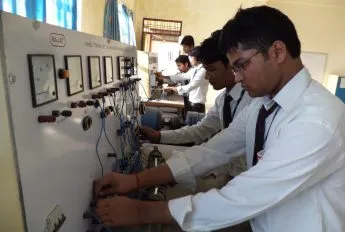
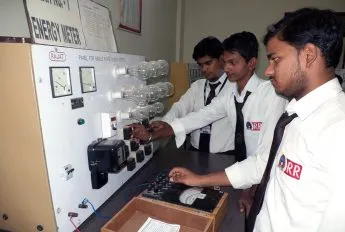
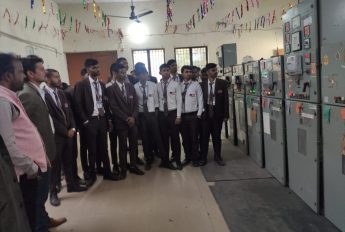
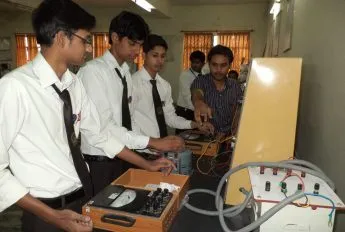
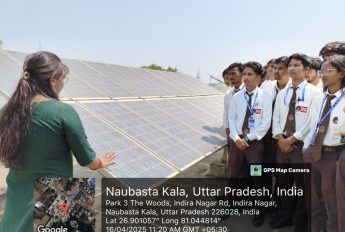
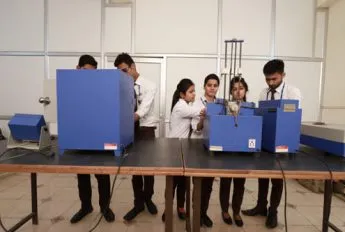
- Address
NH-24, Bakshi Ka Talab, Sitapur Road, Lucknow-226201 (UP) India - Phone
8756008853, 9161888853, 18001020833 (Toll Free) - Email
admissions@rrgi.in - rrimtedu@gmail.com
Department of Electrical Engineering
Vision
To emerge as centre of excellence in the field of electrical engineering to enhance the technical and professional skills of the students and make them competent enough to cater the multidisciplinary needs of the academia, industry and society with strong moral and ethical values.
Mission
- To provide an environment for effective teaching-learning process with incorporation of multidisciplinary approach to develop competent electrical engineers.
- To strengthen the students technically & professionally using state of art technology which leads to successful employability, higher education and entrepreneurship.
- To foster an inspiring atmosphere which induces a passion for lifelong learning with incorporation of human values and ethics.
Program Educational Objectives (PEOs)
- The graduates will analyze, design and develop the tools, applications and systems for real life problems of industry and society.
- The graduates will have the capability of working individually as well as in team with effective communicational skills, leadership quality, ethical values and instinct for lifelong learning.
- The graduates will have the potential for higher education, research and entrepreneurship.
Program Outcome (POs)
Identify, formulate, review research literature, and analyse complex engineering problems reaching substantiated conclusions using first principles of mathematics, natural sciences, and engineering sciences.
Design solutions for complex engineering problems and design system components or processes that meet the specified needs with appropriate consideration for the public health and safety, and the cultural, societal, and environmental considerations.
Use research-based knowledge and research methods including design of experiments, analysis and interpretation of data, and synthesis of the information to provide valid conclusions.
Create, select, and apply appropriate techniques, resources, and modern engineering and IT tools including prediction and modelling to complex engineering activities with an understanding of the limitations.
Apply reasoning informed by the contextual knowledge to assess societal, health, safety, legal and cultural issues and the consequent responsibilities relevant to the professional engineering practice.
Understand the impact of the professional engineering solutions in societal and environmental contexts, and demonstrate the knowledge of, and need for sustainable development.
Apply ethical principles and commit to professional ethics and responsibilities and norms of the engineering practice.
Function effectively as an individual, and as a member or leader in diverse teams, and in multidisciplinary settings.
Communicate effectively on complex engineering activities with the engineering community and with society at large, such as, being able to comprehend and write effective reports and design documentation, make effective presentations, and give and receive clear instructions.
Demonstrate knowledge and understanding of the engineering and management principles and apply these to one’s own work, as a member and leader in a team, to manage projects and in multidisciplinary environments.
Recognize the need for, and have the preparation and ability to engage in independent and life-long learning in the broadest context of technological change.
PROGRAM SPECIFIC OUTCOME (PSOs)
- The graduate will have the ability to design and implement the electrical engineering systems which are environment and society friendly.
- The graduate will use the concepts and techniques of electrical engineering & related engineering branches in designing of electrical systems.
FACULTY OF Electrical Engineering

MR. ANAND RAO
H.O.D.(M.Tech.)

DR. SURESH CHAND
PROFESSOR (Ph.D.)

DR. MALIK RAFI
PROFESSOR (Ph.D.)

MR. VIPIN KUMAR SHUKLA
ASSISTANT PROFESSOR (M.Tech.)

MR. ARUN KUMAR SHRIVASTAVA
ASSISTANT PROFESSOR (M.Tech.)

MR. KESHAV PRATAP YADAV
ASSISTANT PROFESSOR (M.TECH.)

Mr. METHABUL HAQUE
ASSISTANT PROFESSOR (M.Tech.)

MR. LALIT SINGH
ASSISTANT PROFESSOR (M.Tech.)

MR. ROHIT KUMAR GUPTA
ASSISTANT PROFESSOR (M.Tech.)

MR. BRIJESH KUMAR DOHARE
ASSISTANCE PROFESSOR (M.Tech.)

MS. SWAPNIL AGARWAL
ASSISTANT PROFESSOR (M.TECH.)

Mr. PRADEEP KUMAR
ASSISTANT PROFESSOR (M.Tech.)

MR. ANURAG BANOUDHA
ASSISTANT PROFESSOR (M.Tech.)
Ranking among the Top Electrical Engineering Colleges in Lucknow, RRIMT attempts to educate young professionals in the trade in a manner that creates the technocrats of tomorrow.
The department has established following laboratories:
- Electrical Engineering Lab
- Electrical Machines Lab
- Electrical Measurement Lab
- Electrical Simulation Lab
- Control System Lab
- Energy Conversion Lab
- Network System Lab
- Numerical Technique Laboratory
- Power Electronics Lab